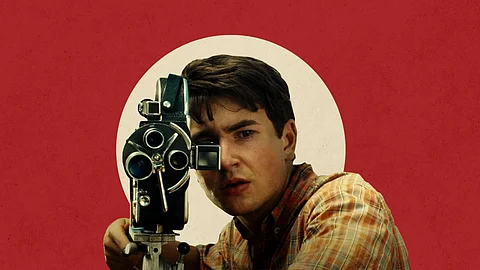
- Reviews
- Power List 2024
- Cannes 2024
- In-Depth Stories
- Web Stories
- News
- FC Lists
- Interviews
- Features
- FC SpecialsFC Specials

Director: Steven Spielberg
Writer: Steven Speilberg, Tony Kushner
Cast: Gabriel LaBelle, Michelle Williams, Paul Dano, Seth Rogen
On January 10, 1952, young Steven Spielberg will visit the cinema for the first time with his parents and watch The Greatest Show on Earth, stupefied into silence by the train accident scene. He’ll go home, briefly regain his voice to ask for a new train set for Hannukah, then proceed to ram it against one of his toy cars in a recreation of that moment. His mother won’t understand his compulsion to replicate the very thing that frightened him until suddenly, it comes to her: This is about control.
That detail provides a singular lens through which to watch The Fabelmans, a richly detailed, utterly immersive snapshot of the director’s early years that’s simultaneously so warm and loving, it feels like it’s being viewed through the guileless eyes of a child, and yet so incredibly graceful and mature in its handling of parental failings that it speaks to the kind of wisdom that’s only possible with age. If recreating our fears is what offers us some measure of control over them, this is Spielberg inviting us into his, processing the painful private experience of his parents’ divorce on the largest canvas he can find, framing and reframing their relationship as much for the audience’s benefit as his, peering through the viewfinder no longer afraid of what he might discover.
The director reconciles the euphoria of falling in love with the movies with the heartbreak of discovering his mother is falling out of love with his father. He captures the disintegration of his family unit even as he acknowledges their collaborative effort that nudged him onto the path to becoming a filmmaker. He understands the dissonance between the version of someone that’s projected onto a big screen vs the person they really are when the lights dim. Calling his film The Fabelmans allows Spielberg to not only imbue the film with a dreamlike quality – though his nods to realism are evident from the specificity of the day on which the film opens – but the plural in the title underscores how moviemaking is far from a solitary profession.
Born to a pianist mother (played by an effervescent Michelle Williams) and a computer engineer father (Paul Dano), it isn’t lost on viewers that Spielberg is the product of art and science combined, much like the movies themselves. Early on, his father explains how motion pictures only move because our optic nerves trick us into believing they do – a speech this film shares in common with Sam Mendes’s Empire of Light, which also premiered at TIFF – while his mother puts it more whimsically. “Movies are dreams that you never forget,” she says.
Initially framed as ethereally lovely in the way all young children see their mothers, it isn’t long before Spielberg stand-in Sammy Fabelman (Gabriel LaBelle) begins to realise there’s something deeply sad under her lightness. The signs of her less-than-platonic affection for her husband’s best friend Bennie (Seth Rogen) are there from the beginning – Spielberg preserves the evidence in the same way his film counterpart does. Williams has long played women in unhappy marriages (Take This Waltz, 2011; Blue Valentine, 2010; Brokeback Mountain, 2005) but what makes this round all the more crushing is that the unhappiness seems to only come from within.
The Fabelmans offsets Spielberg’s ache at his parents’ failing marriage by his joy at discovering just how naturally good he is at filmmaking, even as a teenager. He retraces his early inventiveness with the medium, throwing in little nods to his filmography along the way – a shot of Sammy and his friends riding their bikes down a sunny street echoes the youthful exuberance of ET (1982) – and the film’s final shot is a wonderfully meta visual, an insight into a self-reflective director processing all that he’s learnt along the way. Of all the sights in The Fabelmans, however, its most resonant one is the use of ‘Spielberg Face’, a term coined by critic Kevin B Lee to describe the director’s signature shot in which characters gaze up in adoration at the spectacle in front of them. It’s only fitting that in this heartfelt, sweepingly-intimate film, the recipients of this reverence are the movies themselves.
This review was initially published on 19 September 2022 as part of Film Companion's coverage of the 2022 Toronto International Film Festival